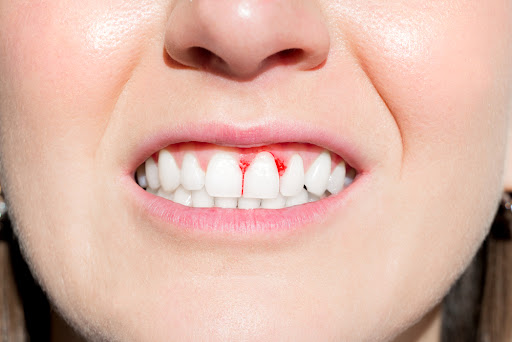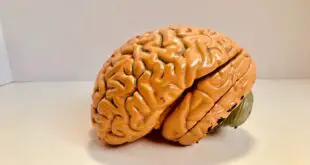You may be pretty surprised to see bleeding on your gums when you floss or your dental hygienist informs you that you have bleeding gum when you go for your cleanup. It might be puzzling, and you may be uneasy about it. Why do gums bleed when flossing?
Gums may bleed during flossing due to issues as simple as you just started flossing, or you may have poor flossing technique. At a worse level, bleeding gums may mean issues such as vitamin deficiency or gum disease such as gingivitis. Keeping gums healthy is the first step to stopping the bleeding.
This post will explore why you have bleeding gums and what you can do to resolve the issue. We arrange them from the simplest to deeper, more severe issues that you need to sort out with your dentist as soon as possible.
Why Do Gums Bleed When Flossing?
Flossing may cause gums to bleed, as the floss wire may cut into the gums. From improper flossing techniques, beginner flossers may also cause their gum to bleed. However, bleeding gums may signal deeper issues such as vitamin deficiency or gum disease.
You Just Started Flossing
If you have never flossed in your life and decided to embark on the flossing regime, you may witness some bleeding in your gums. This is because gums can be similar to other body parts in many ways. They tend to be tender if not stimulated often.
This means when you first start to floss, your gums are still not used to the trauma and the physical pressure it has to endure. As a result, they bleed. However, continuous flossing should make your gums stronger, making them less likely to bleed in the future.
You may like this article: How Many Teeth Does An Adult Have?
Poor Flossing Technique
You may not be flossing your teeth correctly, resulting in injuries to your gum. This might happen especially if you are new to flossing, flossing too rigorously, or you switched dental floss that is harder on your gums.
The key to good flossing starts with understanding why you floss. The goal is to remove the slimy, sticky plaque that builds up between the tooth and the gum. In order to do this:
- Use the floss to reach the bottom of the triangle between each tooth.
- Use the floss to reach as far down as possible without cutting your gum.
- Move the floss back and forth from your cheek to your tongue as you work it between your teeth, which should be close together. Do not let the floss cut into your gums. This is when you may cause bleeding.
- Place the floss in between your tooth and gum.
- Using the shape of the floss, gently push it against your tooth and scrape straight up. Do this twice on each side of each tooth, one at a time for each tooth.
You Recently Had Dental Cleanups
Is there any chance you have recently gone for a dental cleanup? If you are seeing bleeding gums? It might just be the possible culprit.
Dental cleanup requires your dental hygienist to use a scaler deep into the layer between your teeth and gum. These scalers also vibrate and come with water jets to help break up the tartar.
This means there may be some trauma on the gum after cleaning, which may leave it tender. In fact, it is perfectly normal to see some bleeding on your gums during dental cleanup.
If you floss the next day, chances are the gums are still tender, and as a result, a minor cut will result in bleeding. Perhaps the best idea is to leave the flossing off for a day or two for the gum to recover before flossing again.
Plaque And Tartar Build Up
Despite our best effort to floss and clean our teeth, plaque may still build up in our teeth. Plaque is a sticky, slimy layer that may form between our teeth and gums. Regular brushing and flossing may not remove them altogether.
When they stay in the teeth long enough, they turn hard into tartar. Tartars may result in more bacterial growth and eventually cause gum issues such as bleeding.
At this stage, instead of relying on flossing, you should see a dental hygienist immediately. A dental hygienist will have to remove the plaque and tartar from your teeth, so your gum can recover and be healthy again.
Vitamin Deficiency
Gums that bleed may also be an indication of vitamin deficiency. In many cases, vitamin C. Lack of vitamin C may cause bleeding gums. Historically, many sailors who spend a long time at sea without access to citrus fruits developed bleeding gums.
Lack of Vitamin K may also cause bleeding gums, as it is responsible for assisting the formation of bones and teeth. Aside from that, vitamin K also helps with blood clotting.
Suppose you suspect yourself to be in this condition. In that case, you may want to experiment with vitamin C supplements for a few weeks and see if your gum stops bleeding.
The Harvard Medical School suggests that you may start with around 100-200mg of vitamin C daily. If supplements are not your thing, consume more citrus fruits such as oranges. As for vitamin K, you may also consider supplements or simply consume more green leafy vegetables such as kale, romaine, or spinach.
Gum Disease
Bleeding gums may also indicate underlying gum disease due to prolonged plaque and tartar buildup in teeth and gums. Bleeding gums often start as plaque, a sticky and slimy film with bacteria that may form around the teeth and gums. This plaque eventually hardens, forming tartar.
Tartar is also full of bacteria and may eventually cause gums to inflame, bleed and even shrink, resulting in loss of teeth. Infected and inflamed gums are conditions commonly referred to as gingivitis, or periodontitis, with the latter stages of gingivitis.
Suppose you suspect this is the reason behind your bleeding gum. In that case, you may need to see a dental hygienist help check and clean up your teeth and gums, followed by a periodontist to perform deeper cleaning. Aside from reducing and stopping gum bleeding, you may also save your teeth from falling off.
How Often Should You Floss?
In general, it is best to floss at least once a day, with the best time before you go to bed. Floss your teeth before brushing them, as it allows the maximum amount of fluoride to get into your teeth. If your gums bleed, floss after every meal for 3-10 days until the bleeding stops.
The main point about flossing is it gets between the teeth where toothbrushes can’t. If you do not floss, you only clean about half of the places in your mouth.
When you floss, your gums will bleed if you only do it once in a while. You do not usually stimulate the tissue between your teeth. When you floss regularly and often, the gum tissue between your teeth gets stronger and stops bleeding when you floss.
As a start, consider flossing at least once a day. Before brushing your teeth, the best time to floss is right before bed. This lets the fluoride in your toothpaste get to as much of your tooth surface as possible.
You may like this article: Does Everyone Have Wisdom Teeth?
How Frequently Should You Visit A Dental Hygienist?
You should visit your dental hygienist every six months to ensure the regular upkeep of your teeth. Your dental hygienist can perform deeper cleaning on your teeth that you cannot do yourself. Those with poor diet, oral hygiene habits, and gum issues may need to visit dental hygienists more often.
Here’s the thing, despite how hard you brush or floss, you may not be able to completely clean your own teeth since you can’t see into your own teeth. This is why there is such a specialist job as a dental hygienist.
With the right tools, they can perform deep and thorough cleaning that you cannot do yourself. They can also perform checkups and ensure excellent clean teeth with no nasty tartar buildup that may cause bleeding gums. A clean gum and teeth ensure your gums are not inflamed and remain healthy and strong.
Suppose you have a regular diet and oral hygiene and are not suffering from any major dental issues. In that case, you may consider visiting your dental hygienist every six months. However, if you enjoy sugary food or drinks, do not regularly brush or floss, or have gum and dental issues, you may want to visit them more often.
 Being Human
Being Human





